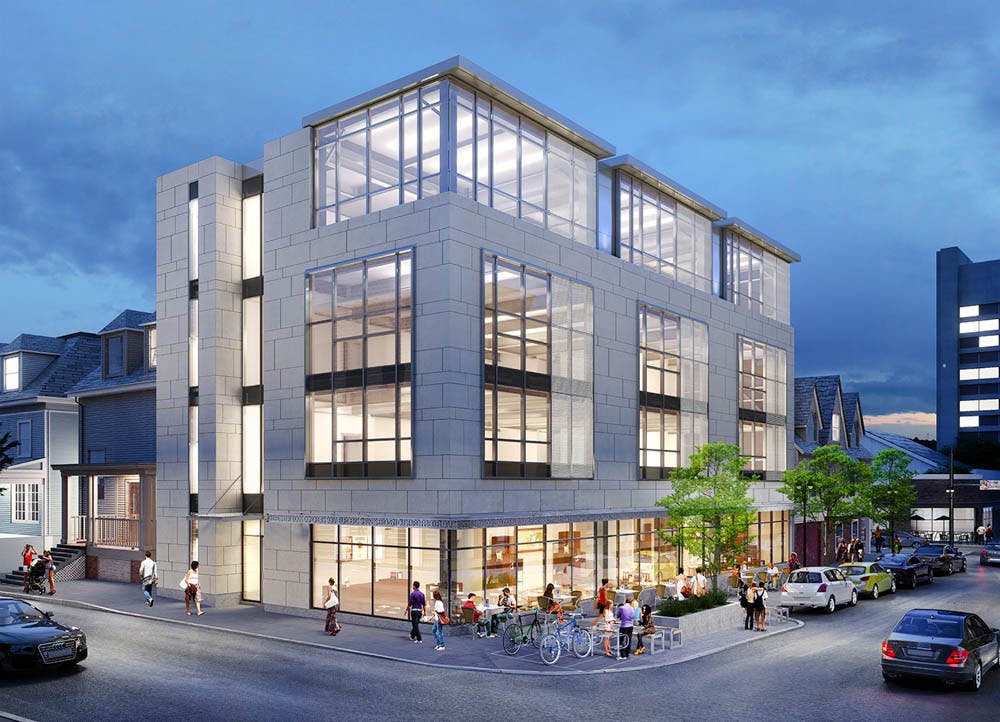For eight weeks over the summer, student entrepreneurs gathered in the workspaces and lecture halls of the new Jonathan M. Nelson Center For Entrepreneurship to work on venture projects through the Breakthrough-Lab program.
B-Lab — a summer program that supports students’ entrepreneurial projects — will close out its fifth annual cycle with a student showcase event Wednesday.
“The intention (of B-Lab is) to provide an opportunity for students to chase a venture of their own creation in a full-time capacity,” said Jason Harry, director of B-Lab. As part of the venture-support branch of the Nelson Center, the program also connects students to sector-specific mentors and provides a $4,000 stipend to cover living costs for the summer in Providence.
This year, the program supported 14 ventures, staying in line with previous participation rates of 12 to 16 projects, Harry said.
B-Lab participants included undergraduate students, graduate students and students from the Rhode Island School of Design. A selection committee comprised of entrepreneurs and alums chose student ventures in the winter, narrowing down applicants from more than 30 ventures to the final cohort, Harry said.
Projects ranged from medicine and education to food and sustainability. This diversity reflects the Nelson Center’s broader definition of entrepreneurship as “a structured process for problem-solving,” said Danny Warshay ’87 P’20 P’23, executive director of the Nelson Center. “All of (the 14 pitches) are focused on solving important problems. They’re using the entrepreneurial process” to identify unmet needs, build small-scale solutions and eventually “develop a higher-impact solution at scale.”
B-Lab focuses on both professional and personal development with the primary goal of educating students rather than just providing funding, Harry said. “This is the wonderful thing about an accelerator operating within a University with students,” he added. “We get to count success if students’ lives are changed, and we get to count success if a venture actually matures to the point where it can actually continue on to the real world.”
This summer marked B-Lab’s first time in the new Nelson Center building. “Being in the (Nelson) Center gave us the opportunity to provide the ventures dedicated space that was really built for that purpose,” Harry said.
Participants emphasized both the collaborative and independent aspects of the space. “Words cannot describe how much I like it,” said Amy Wang ’19 GS, a masters student in political science and founder of the tutoring venture SelectEd. “You have access to support almost every weekday. Also, you have a community of student entrepreneurs.”
Karina Bao ’22, the founder of a superfood venture called Lila, said that B-Lab helped her understand her venture’s customers. “Over the summer, we were able to meet local Providence retailers to get to know them a little better and how they decide what new products to bring,” she said.
Other B-Lab participants noted the value of working with sector-specific mentors, many of whom continue working with students after the program ends.
Students also said they experienced growth in a wide range of personal skills, particularly communication and confidence.
“I knew that going into this was going to stretch me in terms of personal but also professional development,” said Francesca Raoelison ’20, a RUE student and founder of OMENA, a nonprofit that teaches students social and emotional learning.
“I think I became a much better communicator,” Bao added. “Our team doubled from two to four, and I thought a lot about leadership. I thought a lot about what it means to lead by example, to give sacrifices to create a more balanced lifestyle, and to build better habits.”
Participants expressed excitement about the opportunities that may arise after this year’s program. The founders of the medical venture Resuscitech — Abigail Kohler ’20 and Greg Fine ’20 — hope to work on their venture full-time after graduation. Kohler, a biomedical engineering concentrator, and Fine, an electrical engineering concentrator, designed a “real-time CPR feedback device” that helps rescuers know how much force they should be administering during chest compressions, Fine said.





